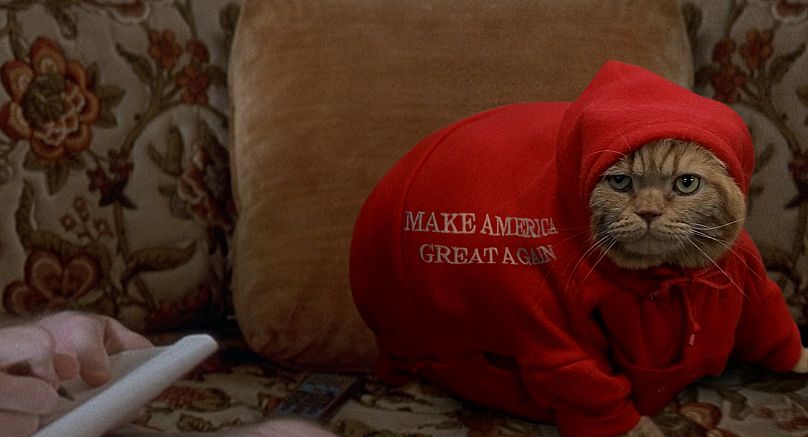Dispatches from Berlin Film Festival: How do you solve a problem like Trump?
The Panorama sidebar section at this year’s Berlinale is highlighting how films can be used as a tool of resistance.
 ADVERTISEMENT
ADVERTISEMENT
 ADVERTISEMENT
ADVERTISEMENT
The Berlin Film Festival has always prided itself on asking the tough questions and exploring the intersections where politics and art collide, and its reputation was further called upon when the Berlinale invited President Zelenskyy to the opening ceremony via video link. The actor turned war president asked the pertinent question: “Should cinema be outside of politics?”
In the case of certain films, they feed off each other, servicing as mutual sources of inspiration, reference or means by which to create topical thematic layers through the echoing of current events.
Two films in Panorama this year stand out so far as examples of this creative marriage. They deal with a recent legacy, a particularly nasty hangover that continues to linger: Donald Trump.
Despite the fact that Darth Cheeto has left public office, a portion of the US has been trying to restore a certain credibility and global standing from the self-inflicted crises, contempt for truth and conspiracy mongering the 45th US president has wrought.
You may think that this is old news, and that the world has collectively moved on, but as with most crises, it takes time to unpack and understand what in blue perfect hell happened for four long years, the true implications behind such a political and culture groundswell, and ultimately, how you solve a problem like Trump to prevent it from repeating itself.
Tina Satter’s Reality and Soda Jerk’s Hello Dankness take two differing experimental approaches in wrestling with post-Trump America, but both manage to hit their targets – and then some.
Adapted from her play ‘Is This A Room’, Satter’s Reality is a snapshot of recent US history recreated as a tense chamber piece. Like in her play, the first-time feature director uses unedited original dialogue from FBI recordings to re-enact the arrest of NSA contractor-turned-whistleblower Reality Winner.
June 2017. Winner (Euphoria’s Sydney Sweeney) arrives home and is met by two FBI agents (Josh Hamilton and Marchánt Davis) who have a warrant and wish to question her. Spoilers ahead for all those who haven’t kept up with the news: the 25-year-old woman is charged under the Espionage Act for leaking a document concerning Russia’s involvement in the 2016 elections to The Intercept – the magazine created by Glenn Greenwald, Jeremy Scahill and Laura Poitras in 2014.
The interactions that follow are tense and unnerving in their delivery, one of the many impressive elements in this lean and highly effective docu-drama. Another aspect, offered by the transition from page to screen, is certain stylistic choices – close-ups, the use of glitches, and literal on-screen redaction which replaces “bleeps” for very eerie and sudden frame disappearances.
At the heart of it is Sweeney’s pitch-perfect performance, a measured turn reminiscent of Julia Garner’s in 2020’s The Assistant, which also graced Berlin’s Panorama section. While Reality is not a #MeToo film like The Assistant, there are further parallels to be made beyond the lead role being a woman in a man’s world. Kitty Green’s film served as a subtle reckoning that had far more lasting power and subtlety than other “MeToo” films like last year’s She Said; similarly, Satter’s striking debut film speaks to a specific time but also one that is ongoing, with confidential documents leaked and US party lines more divided than ever. By crafting such a stomach-knotting huis-clos and allowing Sweeney to shine, Satter highlights that while this re-enactment may be about politics under Trump, it’s also about the way ordinary citizens are pushed to extreme acts under extraordinary circumstances, and how it’s always the same privileged few that get away with it.
As for Hello Dankness, Soda Jerk – Aussie siblings Dan and Dominique Angeloro – take a more direct and cineliterate approach to wrestling with Trump’s US. They grab hundreds of pirated film samples and mash them up to create a new 80-minute-long narrative divorced from original contexts.
Meticulously edited clips, from films (Wayne’s World, American Beauty, A Nightmare on Elm Street), TV (The X Files, Rick and Morty, Euphoria), ads (that godawful and tone-deaf Pepsi commercial featuring Kendall Jenner serves as the prologue), news clips and online sources, cast Tom Hanks as a Bernie supporter, Annett Bening batting for Hilary, Bruce Dern going full MAGA and the Phantom of the Opera doubling for Vladimir Putin.
This playful and delirious hodgepodge bears witness to the clownish shitshow of American politics from 2016 to 2021 and also doubles up as a neat reflexion on the way we consume images, how clips circulate, as well as how image reappropriation and reinterpretation can lead to some very dark – sorry, dank – places.
Despite what it may sound like, Soda Jerk’s labour-intensive masterstroke doesn’t limit itself to all-too-easy Trump bashing and preaching to the converted; they use pop culture as a revealing force. Much like Raoul Peck utilized a variety of film clips in his documentary I Am Not Your Negro (also a Panorama alum) to create a fascinating correlation between the history of cinema and America’s race struggle, Hello Dankness employs exclusively American titles to ultimately reveal itself as a modern Aesop’s fable, wherein the American eagle is wounded by an arrow made of its plumage. Adding to this the fact that the filmmakers essentially replicate the same context-removal tactics used by alt-right conspiracy theorists is further testimony to Hello Dankness ’ potency as a satirical fable. It stands as a satisfying example of the sprinkler sprinkled and how reality has disintegrated into something that has often felt like a warped fiction. And what better way, then, to address this disintegration than through the collective consciousness fed by popular works of fiction created at the heart of the country’s treasured entertainment industry?
The end result is a hilarious narrative collage of great intelligence, one which will have you smiling through residual pain.
So, how do you solve a problem like Trump?
With the rigorous facts adhered to by Tina Satter so that injustices may be addressed.
With the revealing power of laughter Soda Jerk uses to better understand and exorcise demons.
And above all, with cinema willing to pose difficult questions without forgetting to entertain.












